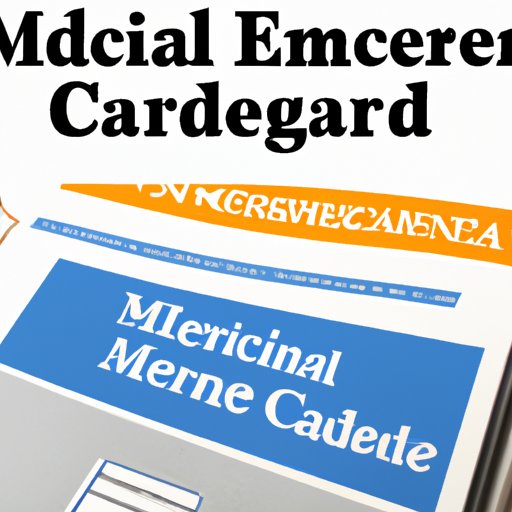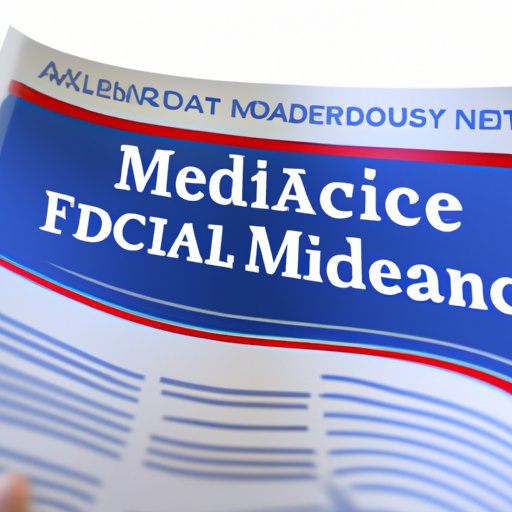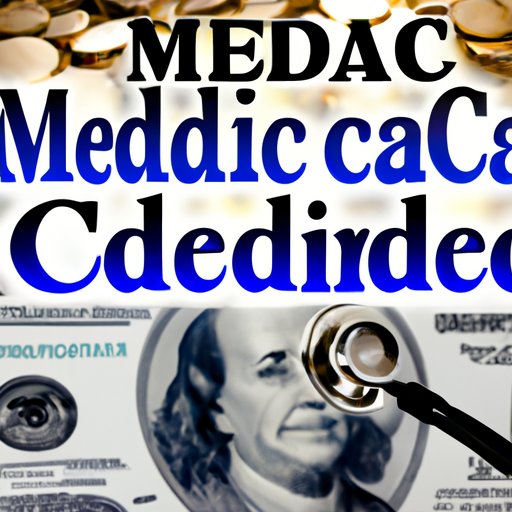Introduction
Medicaid and Medicare are two of the most important programs in the United States. They provide health insurance coverage to millions of Americans and are vital for ensuring access to quality healthcare. In this article, we’ll explore what Medicaid and Medicare are, who qualifies for them, and how they differ from private insurance options.

A Comprehensive Guide to Medicaid and Medicare
Before we dive into the details of Medicaid and Medicare, let’s start with a basic overview of each program.
What is Medicaid?
Medicaid is a federal and state funded health insurance program that provides coverage to low-income individuals and families. It covers medical expenses such as doctor visits, hospital stays, prescription drugs, and other services. Medicaid is administered by the states, but the federal government sets guidelines for eligibility and benefits.
What is Medicare?
Medicare is a federal health insurance program that provides coverage to people ages 65 and older, as well as certain younger people with disabilities. It covers medical expenses such as doctor visits, hospital stays, prescription drugs, and other services. Unlike Medicaid, Medicare is not means-tested and is available to all eligible individuals regardless of income level.
How Are They Different?
The main difference between Medicaid and Medicare is that Medicaid is means-tested and only available to those with low incomes, while Medicare is available to all eligible individuals regardless of income. Additionally, Medicaid covers long-term care services that Medicare does not. Finally, Medicaid is administered by the states, while Medicare is administered by the federal government.

What You Need to Know About Medicaid and Medicare
Now that you have a basic understanding of Medicaid and Medicare, let’s take a closer look at who qualifies for these programs and what types of coverage they provide.
Who Qualifies for Medicaid and Medicare?
To be eligible for Medicaid, an individual must meet certain income and resource requirements. Additionally, some states have expanded eligibility criteria to include individuals and families with higher incomes. To qualify for Medicare, an individual must be age 65 or older, or under age 65 with certain disabilities.
What Does Coverage Include?
Medicaid and Medicare both cover a wide range of medical services, including doctor visits, hospital stays, prescription drugs, and other services. However, there are some differences in coverage between the two programs. Medicaid typically covers more services than Medicare, including long-term care services such as nursing home care and home health care.
How Do I Apply for Medicaid and Medicare?
The application process for Medicaid and Medicare varies by state. Generally, individuals can apply for Medicaid through their state’s Medicaid office or through the Health Insurance Marketplace. For Medicare, individuals can apply online at www.medicare.gov or by calling 1-800-MEDICARE.
Exploring the Differences Between Medicaid and Medicare
In addition to the differences in eligibility requirements and coverage, there are several other important distinctions between Medicaid and Medicare. Let’s take a closer look at the services covered, cost of services, eligibility requirements, and types of plans offered.
Services Covered
Medicaid and Medicare both cover a wide range of medical services, including doctor visits, hospital stays, prescription drugs, and other services. However, there are some differences in coverage between the two programs. Medicaid typically covers more services than Medicare, including long-term care services such as nursing home care and home health care.
Cost of Services
Medicaid and Medicare both have different cost structures. Medicaid is typically free or low-cost for eligible individuals, while Medicare requires premiums, co-pays, and deductibles. Additionally, Medicaid and Medicare may cover different portions of the cost of certain services.
Eligibility Requirements
As previously mentioned, Medicaid is means-tested and only available to those with low incomes, while Medicare is available to all eligible individuals regardless of income. Additionally, Medicaid has more stringent eligibility requirements than Medicare. For example, to qualify for Medicaid, an individual must meet certain income and resource requirements.
Types of Plans
Medicaid offers a variety of plans based on an individual’s needs and income. These plans vary by state and can include managed care plans, fee-for-service plans, and state-specific plans. Medicare also offers a variety of plans, including Original Medicare (Parts A and B), Medicare Advantage (Part C), and Medicare Supplement (Medigap) plans.
An Overview of Who Qualifies for Medicaid and Medicare
Now that you understand the basics of Medicaid and Medicare, let’s take a closer look at the eligibility requirements for each program.
Income Requirements
To be eligible for Medicaid, an individual must meet certain income and resource requirements. These vary by state and can be found on the Health Insurance Marketplace website. To qualify for Medicare, an individual must be age 65 or older, or under age 65 with certain disabilities.
Age Requirements
In general, Medicaid is available to individuals and families with low incomes, regardless of age. For Medicare, individuals must be age 65 or older to be eligible for coverage. There are some exceptions for younger individuals with certain disabilities.
Disability Status
Individuals with certain disabilities may be eligible for Medicaid and Medicare. To qualify for Medicaid, an individual must meet certain disability-related criteria. To qualify for Medicare, an individual must be under age 65 and have a qualifying disability.

Understanding the Cost of Medicaid and Medicare
In addition to the differences in eligibility requirements and coverage, there are several other important distinctions between Medicaid and Medicare. Let’s take a closer look at the cost of these programs.
Premiums
Medicaid is typically free or low-cost for eligible individuals, while Medicare requires premiums. Medicare premiums vary based on income and can be paid monthly, quarterly, or annually. Premiums can also be deducted from Social Security payments.
Co-Pays
Medicaid and Medicare both require co-pays for certain services. Co-pays for Medicaid vary by state, while Medicare co-pays are generally 20% of the cost of a service. Additionally, some services may be subject to a deductible before co-pays are applied.
Deductibles
Medicaid and Medicare both have deductibles for certain services. For Medicaid, deductibles vary by state. For Medicare, deductibles vary by plan type and can range from $185 to $435 per year. Deductibles are generally waived for preventive care services.
Comparing Private Insurance Options to Medicaid and Medicare
When it comes to choosing a health insurance plan, it’s important to understand the differences between Medicaid and Medicare and private insurance options. Let’s take a closer look at how these plans compare.
Coverage Comparisons
When it comes to coverage, Medicaid and Medicare both offer comprehensive coverage for medical services. Private insurance plans may offer similar coverage, but may also have different rules and regulations. Additionally, Medicaid and Medicare typically cover more services than private insurance plans, including long-term care services.
Cost Comparisons
Medicaid and Medicare both have different cost structures compared to private insurance plans. Medicaid is typically free or low-cost for eligible individuals, while Medicare requires premiums, co-pays, and deductibles. Private insurance plans typically require higher premiums, co-pays, and deductibles than Medicaid and Medicare.
Benefits Comparisons
Medicaid and Medicare both offer a wide range of benefits, including doctor visits, hospital stays, prescription drugs, and other services. Private insurance plans may also offer similar benefits, but may also have different rules and regulations. Additionally, Medicaid and Medicare typically cover more services than private insurance plans, including long-term care services.
An In-Depth Look at How Medicaid and Medicare Work
Now that you understand the basics of Medicaid and Medicare, let’s take a closer look at how these programs work.
Enrollment Process
The enrollment process for Medicaid and Medicare varies by state. Generally, individuals can apply for Medicaid through their state’s Medicaid office or through the Health Insurance Marketplace. For Medicare, individuals can apply online at www.medicare.gov or by calling 1-800-MEDICARE.
Claims Process
Medicaid and Medicare both have their own claims processes. Medicaid claims are processed by the state, while Medicare claims are processed by the federal government. Additionally, Medicaid and Medicare have different rules and regulations regarding filing claims.
Appeals Process
If an individual is denied coverage for a service or claim, they may be able to appeal the decision. Medicaid appeals are handled by the state, while Medicare appeals are handled by the federal government. Additionally, Medicaid and Medicare have different rules and regulations regarding the appeals process.
Conclusion
Medicaid and Medicare are two of the most important programs in the United States. They provide health insurance coverage to millions of Americans and are vital for ensuring access to quality healthcare. In this article, we explored what Medicaid and Medicare are, who qualifies for them, and how they differ from private insurance options. We also discussed the services covered, cost of services, eligibility requirements, and types of plans offered. Finally, we took an in-depth look at how Medicaid and Medicare work and how to apply for coverage.
(Note: Is this article not meeting your expectations? Do you have knowledge or insights to share? Unlock new opportunities and expand your reach by joining our authors team. Click Registration to join us and share your expertise with our readers.)
